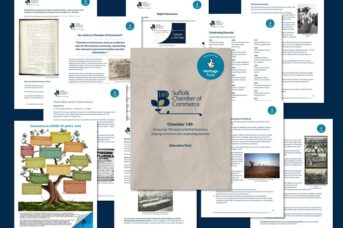Juliet Gilkes Romero is an an award-winning stage and screenwriter. Her play, The Whip, won the 2020 Alfred Fagon Award for Best New Play.
In a recent interview, Juliet spoke with the Chamber’s C140 project team about her career and role on the board of trustees for HighTide theatre.
Early Life and Background
Juliet was born in East London and moved to Suffolk in the late 1970s when her dad took a job at BT in Martlesham. She fondly recalled her parent’s excitement for new opportunities. Her father led BT’s regional cricket team to success, and collaborated with the Ipswich Town football legend, Bobby Robson, in coordinating celebrity matches and taking players to the Caribbean.
Her mother, who trained as a teacher in London, became Suffolk’s first black teacher, starting at Tower Ramparts in Ipswich.
Career Beginnings and Accomplishments
Juliet’s love for theatre was inspired by her parents. She recalled how they often took her and her brother to performances by the National Theatre, the Royal Shakespeare Company, as well as more local visits to the Wolsey Theatre in Ipswich. From here, her love of storytelling grew.
Her early career was as a writer with the BBC, where she worked as a Foreign Affairs reporter and producer. Despite her success in documentary making, Juliet’s passion for theatre led her to pursue a master’s in Writing for Performance, which she described as “life-changing”.
Whilst studying for her MA, Juliet wrote a play, At the Gates of Gaza, which won the 2009 Writers’ Guild Award for Best Play – an experience she described as “mind-blowing”. This play, focusing on the British West Indies Regiment during World War I, showcased her talent for intertwining historical narratives with compelling drama.
The WhiP
Commissioned by the RSC, Juliet wrote a play about the Abolition Act of 1833. The Whip explores the Abolition Act of 1833, a pivotal moment in British history. It delves into the lives of historical figures such as Whig Party Chief Alexander Boyd, Home Secretary Lord Melbourne, and Mercy Pryce, based on real-life Mary Prince, the first black woman to petition parliament.
Through her research for the play, Juliet uncovered complex narratives around the abolition act and other moral issues that were being debated at the time. This included the 1833 Factory Act, the Reform Act, and the issue of Catholic emancipation.
Significantly, Juliet’s work cast a light on the compensation that was awarded to slave owners for relinquishing the slaves – a debt the British government only paid off as recently as 2015.
Read more about Juliet’s play, The Whip, and the uncovering of Britain’s slave trade, here.
Contribution to HighTide Theatre
Juliet’s involvement with HighTide Theatre highlights her commitment to nurturing new talent and promoting regional plays.
As a trustee, she plays a crucial role in supporting the theatre’s mission to bring high-quality productions to both local and national audiences. HighTide’s dedication to finding and nurturing talent, working in schools, and engaging with communities aligns with Juliet’s vision of empowering people through storytelling.
You can listen to Juliet talk about the importance of the HighTide theatre company in East Anglia below.
With thanks to Juliet Gilkes Romero for sharing her inspiring story with the Suffolk Chamber’s C140 project—honouring 140 years, shaping tomorrow, and celebrating diversity.

